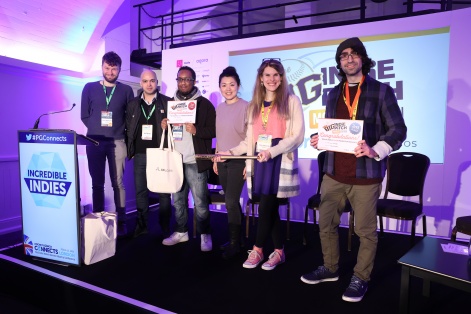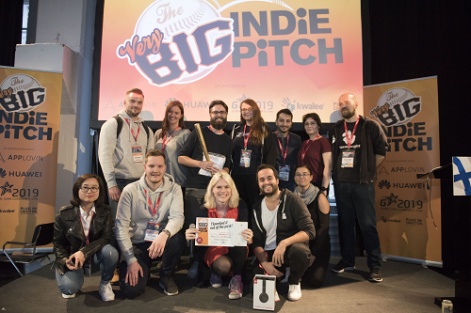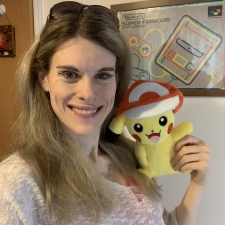Pocket Gamer Connects London returns on 22nd-23rd January 2024, celebrating its 10th anniversary. Of course, this also means the return of our flagship Very Big Indie Pitch, the popular pitching competition that's been providing developers with insight, feedback, and prizes for years.
What better way to celebrate ten years of Pocket Gamer Connects than by having our Big Indie Pitch manager, Sophia Aubrey Drake, connect with some of our most successful developers? In this new series, we’ll learn more about where they are now, what they gained from their pitching experiences, and what advice they have for anyone heading to London for The Very Big Indie Pitch in 2024.
Watch out for regular instalments in this interview series appearing on PocketGamer.Biz in the weeks building up to our 10th anniversary Pocket Gamer Connects London. Before that, however, we catch up with Sophia herself, learn more about her history with the indie community, and hear her advice for all indie developers.

PocketGamer.Biz: You’ve been leading the Big Indie Pitch for a long time now. Can you tell us how you first got involved with it?
Sophia Aubrey Drake: I joined Steel Media in late December 2015 (wow, has it really been eight years?!). By this point, I had already spent several years specialising in, working with, and helping indie developers, most notably as a part of the 100% Indie Initiative at Chillingo/EA. So it’s no surprise the Big Indie Pitch spoke to me; it was something I wanted to be a part of. Even better, though, was the fact that Chris James and the Steel Media team agreed.
I observed my first Big Indie Pitch back at Pocket Gamer Connects London 2016 to learn more before officially taking the reigns at The Big Indie Pitch at GDC 2016 in San Francisco. Interesting fact: Adriaan De Jongh, who won 2023’s London pitch with Secret Shiffle, also won that pitch in 2016 with Hidden Folks.
What’s your own background with indie games? Please give us some insight into your life as a gamer!
Anybody who knows me knows I live and breathe video games. So much so that I have even written a master's degree thesis on the topic (specifically Nintendo and Japan’s video game industry, although my love of games really is wide).
Indie games highlight the creativity and wonder that is the reason so many of us fell in love with games in the first placeSophia Aubrey Drake
Of course, throughout my career, it wouldn’t be an understatement to say I’ve played 1000s of indie games, whether for The Big Indie Pitch, my previous work with indies, or some of my recent work as a judge and mentor. In many ways, this has made work just as enjoyable as my free time.
However, you'd be wrong if you think I’d be done after I clock out of work. Take one look at my phone or any of my consoles, and you’ll see it littered with various indie games. From Big Indie Pitch all-stars like What The Golf!, You Suck At Parking, Hamsterdam and Horizon Chase Turbo to other all-time indie classics (and some of my favourite games of all time), such as Thomas Was Alone, Hotline Miami, Celeste, SteamWorld Dig, and my recent favourite series Dadish. To me, indie games are one of the backbones of gaming and highlight the creativity and wonder that is the reason so many of us fell in love with games in the first place.
What are some of the most challenging aspects of managing the Big Indie Pitch?
Wow, this is a difficult question! Managing the Big Indie Pitch is an absolute joy, and the difficult aspects are totally worth it. However, if I had to point out some challenges, two things come to mind.
The first is all the wrangling of developers and judges. It may not seem it, but The Big Indie Pitch requires some fairly precise control of timings to maximise the number of developers that get the opportunity to pitch, and, maybe more importantly, to ensure the judges have enough time after the pitch to offer quality constructive feedback.
Secondly, actually taking all of this feedback and turning it into something constructive, that helps of the developers as they move forward. For those who want a peek behind the curtain of the private judging, the way it works is the judges are given free rein to discuss their thoughts and feelings about each game one by one in a roundtable format. All of this feedback is then collated by me before being analysed and put into a document I hope is constructive and helpful to each team. It’s a lot of work but so worth it.

How do you perceive the impact of the Big Indie Pitch on the indie game development community generally?
In many ways, I always feel there is more the Big Indie Pitch could do, but then again, I’m always told I’m hard on myself. I can tell you, though, that the amount of kind words and positive feedback I receive about the pitch is amazing. I’m always getting stopped at conferences by indie developers who were either part of a pitch before, or want to be part of one, and by various industry folk who simply want to say hi because they’ve seen the pitch and want to learn more.
Only recently, I was at BitSummit in Kyoto, where I was stopped not only by two industry people who were more than aware of the pitch but also by multiple developers in the showcase there who were former Big Indie Pitch contestants. That says a lot because although we’ve held the pitch all over the world, we haven’t actually hosted one in Japan yet.
The final thing I’d like to say about the impact of the pitch is the one that brings the biggest smile to my face. It's when I see all the former Big Indie Pitch games live on the various platforms (or increasingly in boxed form on shelves).
It brings the biggest smile to my face when I see former Big Indie Pitch games live on the various platformsSophia Aubrey Drake
I can’t describe how proud I feel of the Big Indie Pitch and everyone associated with it when I pick up a box off the shelf and know this was a former Big Indie Pitch game, or when someone spots me playing a game and I can proudly tell them that this was part of the Big Indie Pitch. It's quite something to know we were part of this game and its developer’s journey.
Could you describe one or two standout games that particularly impressed you? What made them memorable?
Putting me on the spot! Before I start, I’d like to say that so many games have impressed me over the years. Too many to name here, or even name in a full day, to be honest!
I’ve already highlighted the fantastic What The Golf! By Triband, which won our Big Indie Awards in 2018 alongside the San Francisco pitch, that year. I also mentioned You Suck At Parking by Happy Volcano, who are also former Big Indie Pitch winners and Big Indie Awards runner-ups.
So, if I had to pick some other titles to highlight, I think off the top of my head I’d point to Zombie Soup which has just been released and came third at our 2019 G-STAR pitch in South Korea. Zombie Soup is an 80s-inspired comedic, frantic twin-stick shooter set during a zombie apocalypse, and it’s one game I couldn’t put down. Another would be MaoMaoCastle by Asobi Tech. Everyone knows I love retro gaming, and MaoMaoCastle is a Space Harrier-inspired title where a magical flying Cat-Dragon is trying to get back to its castle to save its friends. Quang, who runs Asobi Tech, is a wealth of knowledge about retro gaming, and I just love how indie games help keep these classic gameplay styles alive.

What are some key milestones in the Big Indie Pitch’s development over the years?
I think our constant expansion is a testament to the Big Indie Pitch format, and also the wealth of indie talent all over the world. Taking the Big Indie Pitch from being something that was primarily hosted only at Pocket Gamer Connects, to something that turned up at various events around the world was amazing. Whether it was hosting it in a Los Angeles bar after hours during E3, to snowy Tallinn, all the way through to being a part of Korea’s largest games convention G-STAR, this gradual expansion has been amazing and enabled the pitch to reach so many more developers.
However, maybe more importantly, I think I’m just as proud of the work we did during the pandemic. The whole world went from attending monthly events to being locked inside, and I think for many indies, this might have been a scary time wondering how they get both development help and how they get awareness for their game's release. The fact we could pivot and offer digital pitches monthly to give developers who may be unable to travel the opportunity to pitch was very rewarding.
If you have a working build of your project, no matter how early, let the judges play! It leads to more helpful feedbackSophia Aubrey Drake
The games industry constantly evolves. How has the Big Indie Pitch adapted to reflect changing trends within the indie game development landscape?
We’ve constantly been evolving what the pitch actually is over the last eight years. For example, when I began working on The Big Indie Pitch, much like Pocket Gamer Connects it was primarily focused on mobile platforms. However, over the years, we’ve evolved to host more than just the mobile pitch edition, with our latest pitches adding a PC and console edition. We’ve also hosted dedicated Hypercasual pitches and VR/XR pitches.
What essential advice or insights do you have for aspiring indie developers aiming to participate in future pitches?
There are so many things! But let me share here what I usually share with developers before a pitch:
- First and foremost, try not to be too nervous. Yes, it’s natural, but everyone at the pitch loves games and wants to find the absolute best in you and what you’re creating and hopefully help with your future development. So go in positive.
- Secondly, they say a picture paints a thousand words; well, in this case, a game paints a thousand pictures. If you have a working build of your project, no matter how early, bring it with you and let the judges play! Rather than a slideshow presentation, tell them about the game while they experience it. The Big Indie Pitch emulates that quick elevator pitch you may give when you bump into someone or if you having a drink at an afterparty. You only have five minutes to pitch, and talking while they play is a great way to maximise that time and leave a lasting impression. Moreover, letting them play the game usually leads to more helpful feedback.
- Finally, make sure to exchange contact details or add the judges, fellow developers, and even me on platforms such as LinkedIn. Maybe follow up with a quick email after the event. Networking is so important in this industry, and while you may not see the benefits of it immediately, being friendly and making genuine and honest connections will make your future experiences in the industry more rewarding and enjoyable.
I suppose this is an excellent way to let everyone know that our next pitch is The Very Big Indie Pitch at Pocket Gamer Connects London, our tenth anniversary of Pocket Gamer Connects London. Submissions are open now!
Want to show off your exciting new game? All details for Very Big Indie Pitch at Pocket Gamer Connects London 2024, including how to enter, can be found on our upcoming events page on BigIndiePitch.com.
If you just want to attend the conference, then tickets for Pocket Gamer Connects London 2024 (22-23 January) can be found on the Pocket Gamer Connects Website.
Get the latest news, interviews and in-depth analysis on Twitter, Facebook, and our daily newsletter.

















